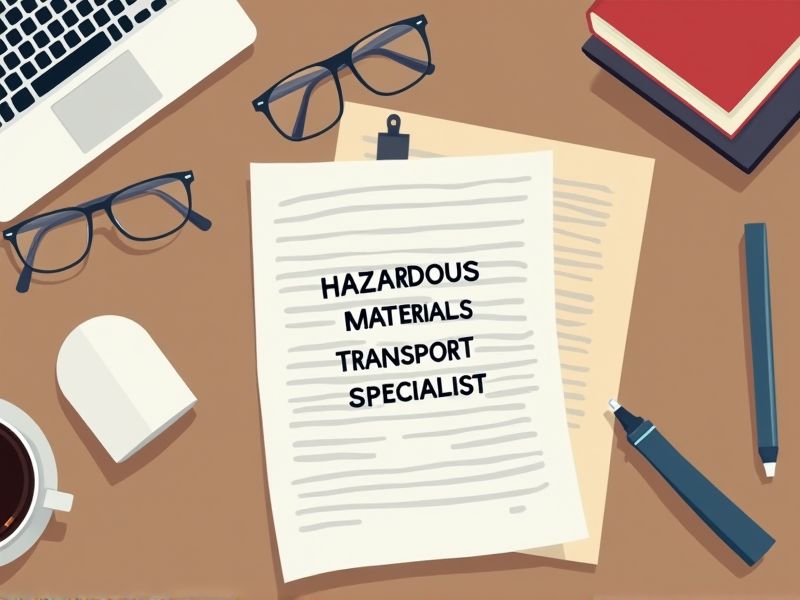
Hazardous Materials Transport Specialists manage the safe and compliant movement of dangerous goods. Certifications ensure they understand regulations, risk management, and emergency response techniques essential for safety and legal compliance. Effective training reduces incidents and promotes environmental stewardship. Key certifications required for a Hazardous Materials Transport Specialist include the following.
DOT Hazardous Materials Transportation Certification
The DOT Hazardous Materials Transportation Certification is needed because it ensures specialists are knowledgeable about federal regulations, which reduces the risk of accidents. Training helps specialists understand classification, packaging, and labeling requirements, which promotes safety during transportation. Certification verifies an individual's competency in handling emergency situations, leading to quicker, more effective responses. Adhering to regulatory compliance prevents penalties and contributes to organizational and public trust.
Hazardous Materials Endorsement (HME)
A Hazardous Materials Endorsement (HME) is necessary for a Hazardous Materials Transport Specialist because it demonstrates the individual's capability to safely handle and transport dangerous goods. Regulatory requirements dictate that only certified personnel can engage in activities involving hazardous materials, ensuring compliance with federal and state safety standards. Possessing an HME signifies adherence to critical safety training and risk management practices, minimizing potential incidents during transportation. The endorsement enhances employers' trust and credibility, strengthening the specialist's professional standing in environments focused on hazardous material logistics.
Transportation Worker Identification Credential (TWIC)
The TWIC card is necessary for a Hazardous Materials Transport Specialist as it ensures secure and authorized access to maritime and transportation facilities. Possession of a TWIC card verifies thorough background checks, enhancing safety and trust in handling sensitive materials. It aids in compliance with U.S. regulations that mandate stringent identity verification for personnel dealing with hazardous materials. The requirement minimizes security risks and fosters a secure environment for transportation operations.
OSHA HAZWOPER Training
Hazardous Materials Transport Specialists face the risk of exposure to toxic substances during transport processes, mandating OSHA HAZWOPER Training for safety comprehension and emergency response skills. Regulatory compliance dictates that personnel handling hazardous materials must complete this training to minimize legal liabilities and ensure operational safety. The training provides specialists with the knowledge to assess and manage potential hazards effectively, reducing the likelihood of accidents. Proper education on personal protective equipment and procedures leads to a safer working environment, aligning with industry safety standards.
IATA Dangerous Goods Regulations Certification
The IATA Dangerous Goods Regulations Certification ensures that a Hazardous Materials Transport Specialist understands the complex regulations governing the safe transport of hazardous materials by air. It enhances safety protocols and reduces the risk of accidents during transportation. Employers value this certification as it demonstrates a specialist's competence in handling dangerous goods in compliance with internationally recognized standards. The certification reflects a commitment to regulatory compliance, which is crucial for maintaining the integrity of global supply chains.
IMDG Code Certification
The IMDG Code Certification is essential because it ensures that hazardous materials are transported in compliance with international safety standards. When a specialist obtains this certification, it reduces the risk of accidents and environmental harm during shipping. The certification provides a thorough understanding of proper labeling, packaging, and documentation for hazardous materials. As a result, it fosters safer global trade and minimizes legal liabilities for shipping companies.
PHMSA Hazardous Materials Training
A proper understanding of PHMSA Hazardous Materials Training ensures that Hazardous Materials Transport Specialists effectively regulate transport in compliance with federal safety standards. Proper training reduces the likelihood of accidents by ensuring specialists are versed in handling protocols and emergency responses. It enhances knowledge on legal regulations, which mitigates the risk of costly violations and improves accountability. Trained specialists are better equipped to create safer transport systems, contributing to public and environmental safety.
Certificate in Hazardous Materials Management (CHMM)
Possessing a Certificate in Hazardous Materials Management (CHMM) ensures a Hazardous Materials Transport Specialist is well-versed in regulatory compliance, which precludes potential legal issues. The certification equips professionals with necessary knowledge to safely manage and transport materials, decreasing the risk of workplace accidents. It enhances the specialist's ability to identify, classify, and mitigate hazardous materials, minimizing environmental impact. The certification validates expertise and credibility, boosting career prospects and trust with employers and clients.
NFPA HAZMAT Awareness Certification
NFPA HAZMAT Awareness Certification equips specialists with the knowledge to recognize hazardous materials, ensuring efficient identification and risk assessment during transport. This certification enhances safety measures, reducing the likelihood of accidents and environmental contamination. Proficiency in hazmat awareness leads to compliance with regulations, minimizing legal repercussions for transport companies. Certified specialists contribute to a safer work environment, fostering public safety and trust in the industry.
Emergency Response (NIMS/FEMA) Certification
Hazardous materials transport specialists face complex situations requiring standardized procedures, and NIMS/FEMA Certification provides a comprehensive framework for coordinated emergency response. Certification ensures the specialist understands federal guidelines, reducing the risk of errors during hazardous material incidents. By adhering to this framework, specialists improve communication with other agencies, which is crucial for efficient and safe material transport. Certification enhances credibility with employers and stakeholders, demonstrating commitment to safety and competence in handling dangerous goods.
Summary
When you obtain certifications as a Hazardous Materials Transport Specialist, you enhance both your professional credibility and employability. Certification demonstrates your commitment to safety and industry standards, which can lead to increased trust from employers and clients. You may also experience improved job performance due to a deeper understanding of regulations and best practices. Overall, certified specialists often see potential for career advancement and increased salary prospects.
